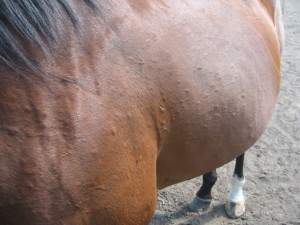Summer Pest Control

This time of years flies, gnats and mosquitoes can be irritating and even lethal to some horses. This horse has itchy bites all over. Pest control can help alleviate some misery for horses at this hot time of year.
This time of year, bugs can be a problem for horses. Especially in areas that have been having a lot of rain. There is more standing water—a breeding ground for many varieties of irritating bugs. Flies, gnats, mosquitoes and culicoides (no-see-ums) are just some of the many different kinds of insects that can have a harmful effect on horses. At best, they can be irritating and cause horses to itch. At worse, they can bring disease and even death if horses aren’t protected.
Many types of external parasites can be deterred with fly spray or a rub-on type of repellant. But it has to be done regularly as it tends to wear off over time. Many horse owners have preferred types of repellants. Avon’s Skin-So-Soft is popular among horse owners because it is potent enough to keep away flies and it has a pleasant smell.
In areas that are heavily populated by flies, traps or bait pellets, such as QuickBayt®, can be useful for fly control. Some horse owners employ the use of beetles or fly predators. Fly predators are smaller flies that feed on larger pest flies when they are in their pupa stage of growth. The pest fly population is curbed before they have a chance to mature. For this reason, putting fly predators out early in the season is a good idea. Fly predators do not bite or sting and live near manure piles or dumpsters (anywhere pest flies are pupating). These predators can only be effective if the right number is introduced to your area at the right time. Spalding Labs can give an estimate for how many fly predators would be needed for your specific situation.
Some horses are so affected by insects that they itch until they lose big patches of hair. Applying nitrafurazone or other counterirritants can offer relief to an itchy horse but will not deter external parasites from continuing to feed on the horse. Not all horses are the same. Some horses seem to be allergic and have sensitive skin. They can be tormented by flies while other horses in the same pasture may not be affected. A veterinarian might recommend and prescribe a corticosteroid such as Prednisone to help treat the symptoms of the allergy. Horses may differ in how they react to the drug.
A study in Australia concluded that sandflies (culicoides or no-see-ums) fed most actively during the dusk hours. Sensitive skinned horses that were kept in screened stalls from 4pm to 7pm stopped itching and showed a positive difference. When they were let out during these hours again, their allergies came back. (Holden, Western Horseman, June 1992, pp 104-107) Keeping a horse in a stall at dusk may help.
Along with just irritating horses, insects can be deadly to horses. Horses should be vaccinated against prevalent diseases in your area such as West Nile or Potomac Fever. Horses can contract West Nile from mosquito bites. They can get Potomac Fever from accidentally eating mayflies. Vaccines are available for these diseases but they may not cover all strains so parasite control is a good preventative measure. Horses that get West Nile or Potomac Fever often get laminitis as a result of a stressed system. If the resulting laminitis is not treated, the prognosis for the horse can be poor. Treating laminitis can take up to a year for the horse to make a full recovery.
Taking care of horses is a great responsibility. Being aware of how we can help horses individually will make their lives better and make us better horsemen and horsewomen.
Related Posts
-
We all value our animals — both in terms of money and our ...Aug 23, 2018 / 0 comments
-
Since horses can make a difference in our lives, and even ch...Dec 04, 2012 / 0 comments
-
A recent Gallop poll reported by CNN and USA Today revealed ...Mar 22, 2011 / 0 comments
Blog Categories
- Anatomy
- Best Business Practices
- Conformation
- Current Events
- Customer Service
- Draft Horse Shoeing
- Equine Soundness
- Essential Anatomy Kit
- Farrier Careers
- Farrier training
- Foal soundness
- Horse Care
- Horse Foot Care
- Horse Owner Tips
- Horsemanship
- Horseshoeing
- Horseshoeing History
- Iron and Forge Work
- Student Spotlight
- Uncategorized
- Veterinary Care
Blog Archives
Contact Us
Butler Professional Horseshoeing School
495 Table Road
Crawford, NE 69339
(800) 728-3826
jacob@dougbutler.com
Subscribe to Our Blog
Get Our Free e-Book!
If you think you want to become a farrier (or know someone who does), this book can help you make that decision. Horse owners will learn the importance of choosing a qualified farrier and how to select the “right” one.
[ Get the e-Book Now! ]
- Follow:
